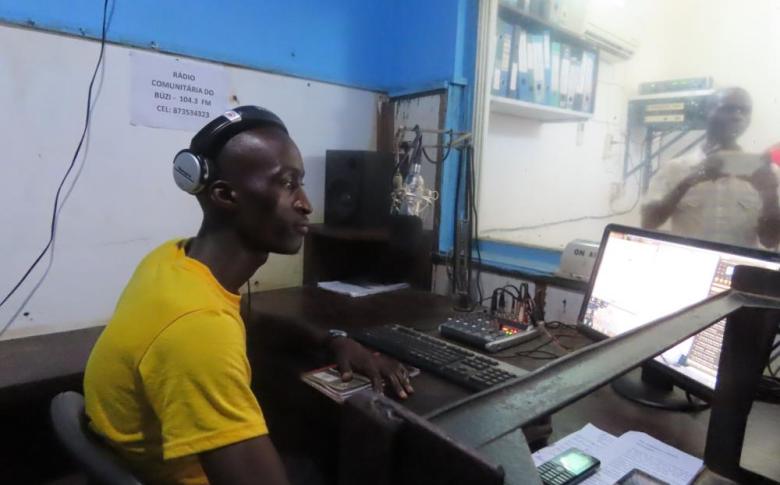Radio broadcasters in Mozambique are at the heart of the community, spreading information that can save lives during a natural disaster.
More than 1.9 million listeners are once again tuning in to their favourite radio stations in the cyclone-affected districts of Dondo, Nhamatanda, Gorongosa, Búzi and Beira in Sofala - the province hardest-hit by Cyclone Idai on 14 March.
The Emergency Telecommunications Cluster (ETC), led by the World Food Programme (WFP), carried out swift assessments in Idai’s wake, set up communications services for humanitarians and looked for ways to enable the affected population to access information. Amid the devastation caused by Cyclone Idai, the cruciality of radio in daily Mozambican life was evident and the ETC identified six community stations needing urgent rehabilitation; now with new communications towers, antennas and electronic equipment initiated by the ETC, community radio transmissions are active again.
In Mozambique, community radio stations play an essential role as amplifiers of public service information and they are also instrumental for reaching the most vulnerable groups including women, children and people with disabilities.
Radio messages can be broadcast about how to prepare for future cyclones, alert the population of an impending storm, spread knowledge about how to avoid cholera and malaria in the aftermath of a cyclone and be used to locate loved ones.
“When disasters like cyclones strike, communication is vital,” says Enrica Porcari, Chair of the ETC and Chief Information Officer of WFP. “It is essential not only for humanitarians to respond efficiently and effectively but also for affected populations to have access to communications so they can find out lifesaving information about the response and assistance available to them, but also to reach out to their families and friends,” Enrica says.
Reaching the people
The ETC has been collaborating with the National Forum of Community Radios (Forum Nacional de Rádios Comunitárias - FORCOM) to revive the six radio stations.
Feroza Zacarias, FORCOM’s Executive Director, expressed her gratitude to the ETC, WFP and the United Nations for the technical support to Mozambicans. One of the great challenges Mozambican community radios face, she says, is obtaining the necessary equipment.
“Without this support, those community radios were in danger of completely disappearing, and when a community radio disappears the community’s ability to access to information is in jeopardy. In most of the rural areas of Mozambique, populations rely entirely on community radios to stay informed and to actively participate in local development,” Feroza says.
Radio for early warning
Natural disasters cannot be prevented, but their impact can be reduced by preparing local communities before these events happen.
While the ETC played a critical role during the response, its preparedness actions are just as important, says Karin Manente, WFP Mozambique Country Director. “These concrete actions show that we can better bridge the gap between humanitarian response and recovery, and better rebuild destroyed infrastructures taking closely into account preparedness aspects, while addressing people’s access to information,” she says.
With preparedness in mind, a “lessons learned” workshop was convened by the ETC, drawing 20 community broadcasters to Beira in mid-November to identify and begin to address gaps in coordination, information flow and local technical capacity. The Sofala Action Plan on Disaster Preparedness for Community Radios, endorsed at the meeting, highlights key appeals and priority issues to equip community radio broadcasters before the next disaster.
Broadcasters also re-affirmed their commitment to encouraging government and civil society to formally recognize community radio as an early warning alert mechanism for informing and preparing communities for future disasters.
